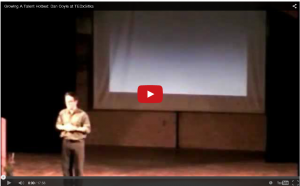 Hi there! This is Birgit and Kristy from Langports Sydney. Today, we would like to tell you how important it is to make mistakes when learning English!
Hi there! This is Birgit and Kristy from Langports Sydney. Today, we would like to tell you how important it is to make mistakes when learning English!
Do you fear making mistakes?
Are you feeling self-conscious when speaking?
Are you always using the same, all too familiar and easy words?
Do you sometimes feel like a hamster running on a wheel – that you lack some improvement?
In the classroom we have students who know the right answer, but they don’t always want to say it aloud in class. We know they know, but they’re often shy or afraid of making a mistake. When we talk with these students they tell us they feel that everyone else understands but they don’t. In fact, this couldn’t be further from the truth. We can tell you that this is a very common feeling when learning new things. The fact is that every student is in the same boat, and in the classroom for the same reason: to learn!
What do a Brazilian soccer team and learning something new have in common?
increase pressure + self-correct + retry = successful improvement

Watching Dan Coyle’s TEDx talk recently on “Growing a Talent Hotbed”, it became clear to us how much it related to the way our students feel in the classroom. Coyle emphasises the need to challenge yourself in order to overcome the ‘making mistakes’ barrier, and as a result, improve your learning outcomes. He coins the phrase make a reach which describes the step you have to take to get to the next level. We see how much this can be applied to our students’ learning, too.
To summarise:
- you only get to the next level if you reach out and allow yourself to make mistakes and learn through making them
- leave your comfort zone and embrace the struggle to increase learning
- a mistake is an important tool to help you find the right answer
- trial and error will eventually result in success
- you have to make a reach
Remember: there’s always a next level – learning never stops.
What we’ve written here is true for every level – and the higher your English level, the harder it gets, and the more self-discipline it requires.
‘There’s too much improvement.’
Student Under Pressure, 2015
…and the pressure didn’t kill them! They used it to get to the next level.
So what are some things YOU can do NOW to overcome these fears and improve your English language skills?
→ lack of vocabulary? Read one newspaper article a week, focus on a small number of words per article (10 per page), use monolingual dictionary, check usage, collocations, word family and —most importantly — use new words in class and outside the classroom. Try them out, see if people understand you — make them your own! Become friends with them!
→ new grammatical constructions? Use any chance to incorporate them in your writing, your speaking and look for them in any reading that you do to see how they are used.
Watch Dan Coyle’s video about Growing A Talent Hotbed:
